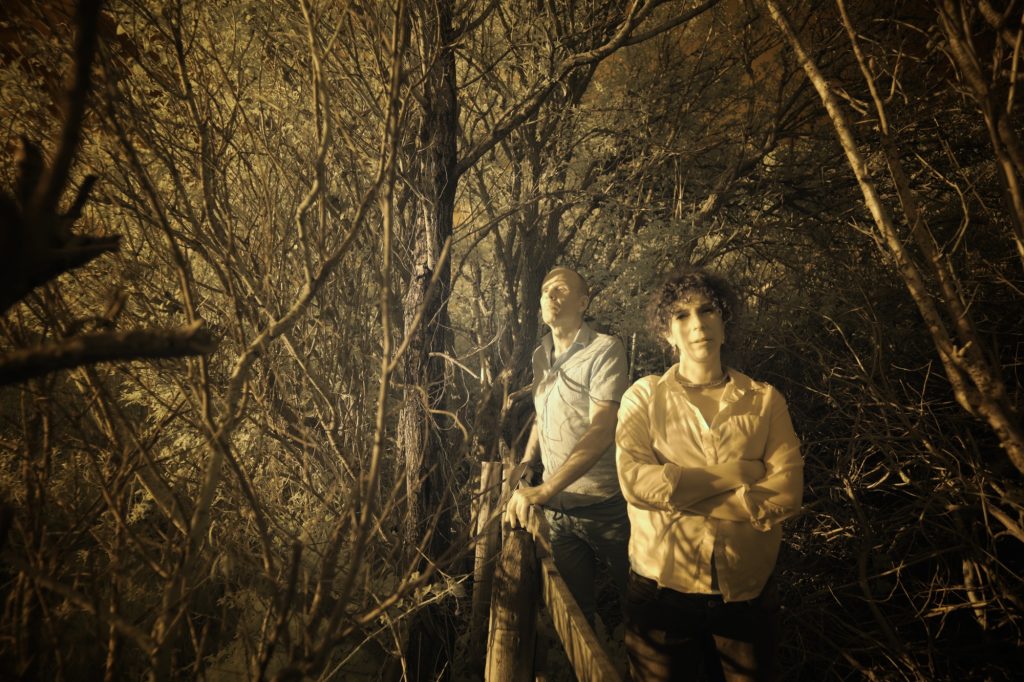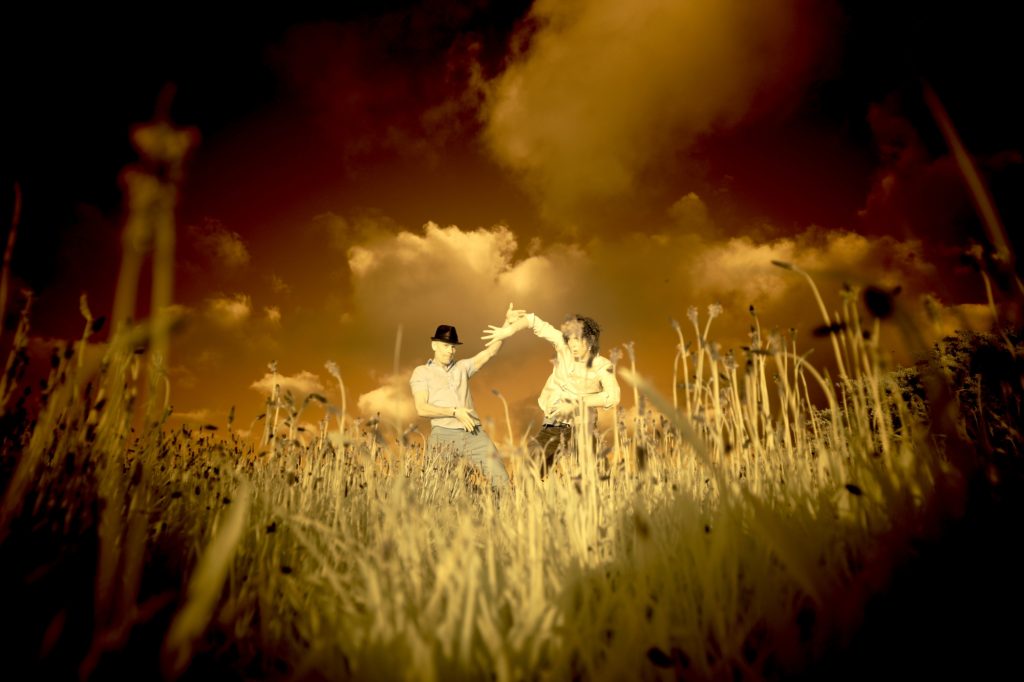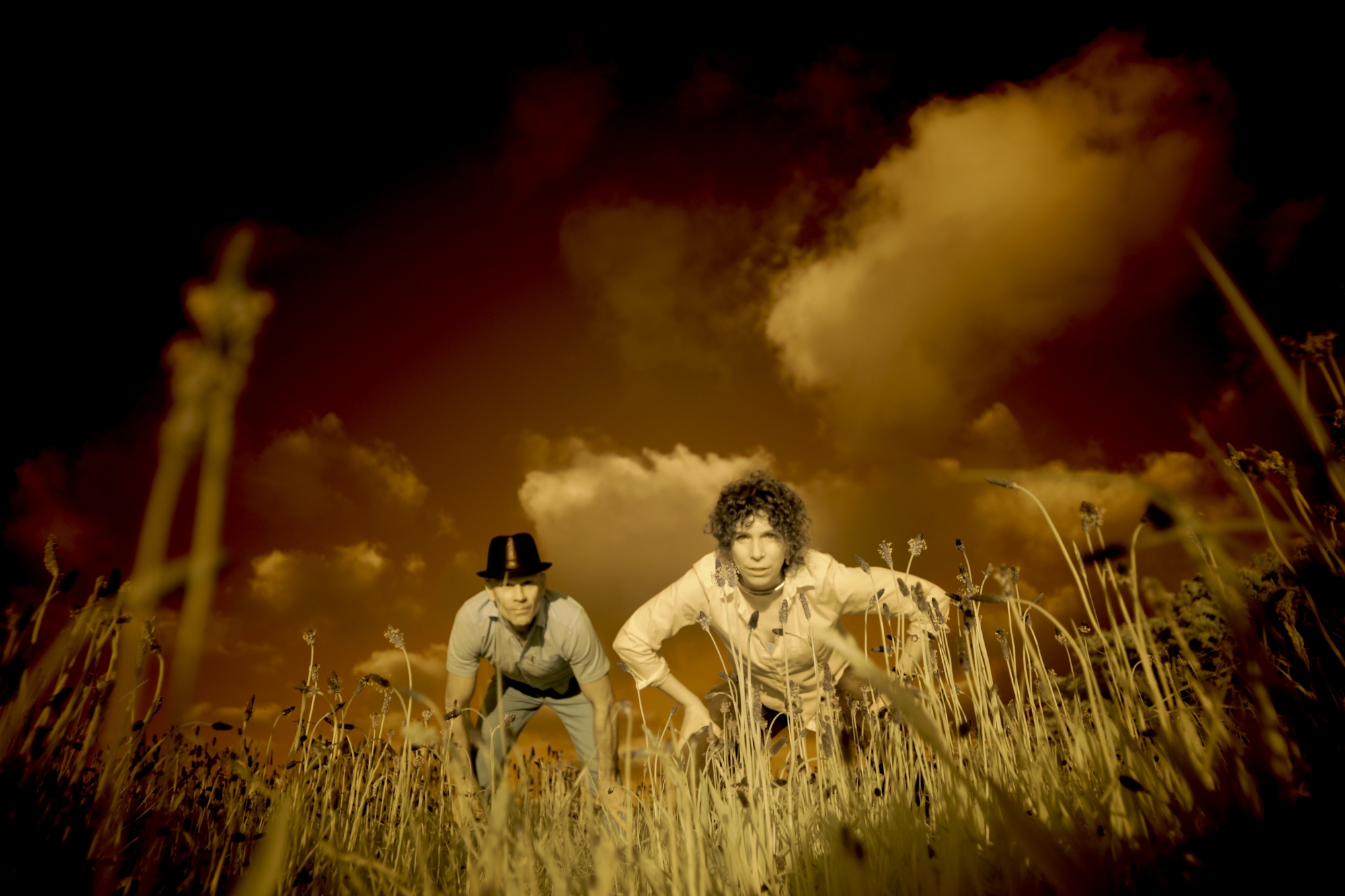The Irish musician Ciara O’Flynn has been playing for most of her life. “The first instrument I had was a violin,” she tells Post-Burnout. “I was really lucky because one of the members of the RTÉ Vanbrugh String Quartet moved next door to us when I was quite young, like seven, and his wife taught violin, so my mum was like, ‘Do you want to give the violin a go?’, and I was like, ‘Yeah, yeah! Cool,’ you know?
“So, that’s what I did. I did Suzuki method classical music for probably seven years after that, and enjoyed it, but then I discovered rock music and had no more interest in playing Vivaldi!”
She continues, “I was just really into music. Dad was always into rock music. Neither of my parents played or sang, but there was always music on and they were really both into it and Dad, especially, was into rock music, so I kind of grew up with it and was drawn to it.
“One of the most formative things was there was a music library in the City Library in Cork, so my dad used to give me a couple of his little tickets to get books, and I used to go get CDs, and it could be anything. I’d just come home with a bag of stuff, you know?
“And I discovered Pixies. I picked up Trompe le Monde and was like, ‘What’s that? Oh, I’ll throw it on.’ Then there was Nirvana…when was that? 1993, ’94? I was about 13, you know? Discovering Nirvana then, and grunge, and Pixies, and all of that. I suppose that was my first independent listening.”
Not long after, Ciara began playing in bands around the city and eventually enrolled at the University College Cork. “I studied Music for a year, and it was life-changing, in so many ways,” she says. “We were studying Vivaldi and Mozart, and all of that, but also, [we had] a huge exposure to traditional music, and Mel Mercier was the Ethnomusicology teacher at the time, so exposure to gamelan and world music and things like that.
“So, I just absorbed all that, but they didn’t seem to, consciously anyway, crossover. I was rocking out at the weekends and on Wednesdays, and then I was going to college and learning about all this different type of music, but I don’t think that really manifested, in terms of integration, until much later.”
Around a decade later, Ciara found herself in a job that paid the bills but didn’t fulfil her. Partly circumstantial, an opportunity came for her to explore her creative endeavours further. “I finished up at an art college in 2011,” she says. “I went back to college and studied Visual Arts. I was really just gung-ho about keeping a visual arts practice on the go and was conveniently made redundant in Cork.
“It was one of those things where the job was so sweet, I didn’t want to let it go, but I did actually want to go. So, eventually, the recession came and manifested itself. So, myself and my partner moved to West Kerry to learn Irish and discovered a really vibrant arty community down there, and one of those people was Mark.”

Courtesy of Amplify Agency
Ciara is referring to Mark McLoughlin, a person with a not-too-dissimilar musical background as her. “I went through years of classical training, also, from the age of about six,” Mark says. “You know, I did all the grades in piano and clarinet and all that shit, which I hated to a point.”
Interested in more experimental modes of expression, Mark found a way into the music industry at a young age. “I guess my first kiddie kind of bands would’ve been New Order, post-Joy Division kind of stuff,” he says.
“I was always into quite alternative stuff from quite a young age, and I started quite young because I went, pretty much, straight from school into Windmill Lane Studios, because, at the time, you couldn’t study it. I went off to Germany to work for a year, to go into college over there to study Music but, instead, I got offered a job in Windmill Lane.
“At the time, they used to send you for modules over to Leeds University and stuff, but that was kind of an immersion into all kinds of everything. I was kind of into very alternative stuff but, also, experimental art stuff and world music. [Laughs] A total and utter mishmash of things! I’ve had careers in the music business, the art world, and a brief foray into journalism.
“Now I’m a filmmaker; I now make documentary films. But I’ve always been interested in new music and continue to be interested in new music, and that’s the kind of thing that inspires and stimulates me most to many genres.”
Mark moved from Dublin to Kerry, and, around this time, Ciara – attempting to keep her solo project going after moving from Cork – began establishing local open mic nights. The two met as Mark began attending these events and was drawn to the art that she was making. “It just kind of clicked, I guess,” Mark says.
“We had similar-ish interests in things. We both had a substantial art…like, I guess my longest career has been in art and visual art, so I guess we both have that in common and an urge to do something a bit refreshing and challenging.”
At the time, Mark had some solo and collaborative music he was working on. Ciara had come from playing shoegaze-inspired, Mogwai-esque rock music at home and was looking for something else. Soon, the two began collaborating. Ciara remembers, “Some days, we’d have amazing rehearsals, just for two people, and I’d be driving home, going, ‘Jesus, this is so interesting.’”
However, there were some differences between their approaches. Mark says, “I came from a [position] that music was lyrical, so that music spoke, so I didn’t think in lyrics. Whereas Ciara thought a lot more in lyrics than I did.
“So, in that way, our collaboration worked very well because I thought only, really, in music and she interpreted the ideas that I would come up with into words, and the words seemed to work with the feelings that were being induced by what I was churning out.”
This is the origin of Pinhole, a nonpareil project in the Irish music scene. The band’s press release cites influences from the likes of Kate Bush, PJ Harvey, Bat for Lashes, Portishead, and Björk. From this author’s perspective, I also hear similarities to the likes of Young Marble Giants, The Raincoats, The Slits, early Chumbawamba, and dark cabaret.
“I’m inclined to say nothing is considered when it comes to Pinhole,” says Ciara of their sound. “I don’t know about you, Mark, but I don’t want to fit in anywhere. I’m not interested in being a part of an identifiable set and a scene. I’m just really interested in the creativity. I don’t understand the world, or myself, or anything, so one of the ways I do that is through music.”

Courtesy of Amplify Agency
A mutual goal of Ciara and Mark is eschewing their respective classical training. Mark recalls that his dad, who was involved in the local arts scene, would throw house parties, with some guests being skilled members of revered orchestras. However, when asked if they would like to play a song, these talented musicians were incapable of improvisation, which was completely antithetical to Mark’s propensity for experimentation.
Ciara’s rejection of incorporating her training in her songwriting stems more from the fear of ruining the mystique of the craft. “I wouldn’t have brought any of the training and music into songwriting,” she says. “I don’t understand songwriting; it’s a complete mystery to me. I would never sit down and go, ‘Alright, this is the structure.’ It’s always stream-of-consciousness, it’s always following my nose. Like, Mark will throw something at me and we’ll play with it, but it is purely playful, and then something comes out of that.”
The other distinctive aspect of Pinhole’s music is its exploration of modern-day politics. “I’m interested in what it is, in this human existence, and I’m interested in what’s going on,” Ciara says. “Like, I’m suffering a lot from insomnia at the moment, and I find myself listening to a lot of The Rest is Politics, and Alastair Campbell, you know, and just tuning into what’s going on in America and, obviously, with Gaza. And that’s just what I’m interested in in my life, you know?
“Mark, I think, would be the same. We’re both quite socially conscious and aware. I, personally, have a disdain for narcissism, and I think our society, at the moment, is drifting that way. […] Personally, I use my creativity to try and understand the world and what’s happening, and that naturally leads to what’s going on, politically and socially.
“I would’ve grown up in a house that was very politically aware and active; both my parents were activists and involved in setting up the Green Party and that sort of thing, so I would’ve just grown up with that around the table, so that’s just natural for me, to incorporate all of that.”
Pinhole have been active for around a decade now, and, just yesterday, released their debut album, Sweet Spot. “Mark and I had always been working towards making enough material for an album,” Ciara says of Sweet Spot’s background. “And, then, we got ourself into that position just before the pandemic.
“So, we had an album recorded, ready to go, PR lined up and everything, and the pandemic hit, I think, like two weeks before we were just about to do a big launch and a tour and everything. So, that album just sat there; we didn’t know what to do with it.
“We had continued to write and play together in as much as we could; Mark lives in Kerry, I now live in Cork. The pandemic and all of those restrictions, it was a really interesting time for us both, and some really nice, good songs came out of that process. Just the stillness and everything sometimes makes you understand and hear better.
“So, we scrapped a lot of that album and decided to make a new one. I guess it was just in us; we had all this built-up expectation and want, and that was all paused, so, yeah, rather than just release it…it kind of didn’t seem creatively relevant anymore, given the experiences that we’d all had as a nation and world, so then we decided to rerecord and get the new songs down and release them.”
Sweet Spot was funded in part by the Basic Income for the Arts (BIA) pilot scheme, which Ciara was initially reticent to discuss, but has decided to talk about in order to highlight its significance. “God, what a lifesaver,” she says. “I don’t think the album would be out if it wasn’t for that.
“I’m at a stage in my life where I need to set myself up: I have a child, I need to buy a house. Turning around to your partner and saying, ‘Oh, yeah, you know that fourteen grand I’ve saved? I’m going to spend it on an album!’ [Laughs] You know? Rather than on a house or something!
“So, it just came at the right time, and it meant that we could spend longer in the studio than we normally would’ve been able to afford to do. Like, there are so many artists I know that are amazing and they just can’t afford to get their music out there because it is expensive. Like, an album costs at least ten grand. More.”
Now, after many years of trying, Pinhole’s debut album is finally available for public consumption. When asked why people should check it out, Ciara responded, “We’re trying to offer something a bit fresh, something stimulating, between the lyrical content and, also, even down to the production of it. I think it’s really interesting. Of course I do, because I made it!
“It’s just something slightly different; like I was saying, we’re not trying to fit in anywhere, so it does, I think, stand out on its own a little bit. I think it’s fresh, I think it’s interesting, I think it’s stimulating, and I’d really encourage people to listen to it for those reasons. Just to try and listen to something new.”
Pinhole’s debut album, Sweet Spot, is out now on all streaming platforms. You can keep up to date with the band on Facebook, Twitter, and Instagram.
Tune into POSTBURNOUT.COM Interviews… tonight at 21:00 (IST) to hear this interview in full where we go into further discussion about everything discussed, as well as Mark’s time at Windmill Lane, working on material for The Cure and U2, how his career as a filmmaker differs from being a musician, and much more. Available on YouTube, Spotify, Apple Podcasts, and Amazon Music Podcasts.

Aaron Kavanagh is the Founder and Editor-in-Chief of Post-Burnout. His writing can also be found in the Irish Daily Star, Buzz.ie, Totally Dublin, The GOO, Headstuff, New Noise Magazine, XS Noize, DSCVRD and more.

 POST-BURNOUT
POST-BURNOUT